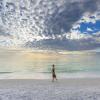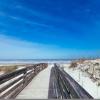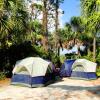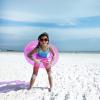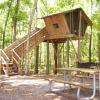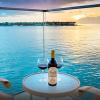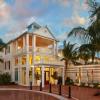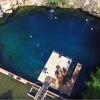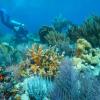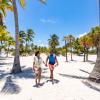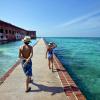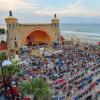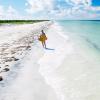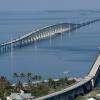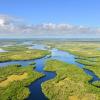By Dalia Colón
Growing up in Orlando, Farhan “Ronny” Ahmed was the outdoorsy type—an Eagle Scout whose mom took him to beaches and state parks, canoeing and fishing.
But after a random act of violence left the college student in a wheelchair, getting back to nature was the last thing on his mind.
“It was so chaotic and something that my family had never dealt with before,” says Ronny, who is currently working on his engineering degree at Florida State University.
Life worth living—and leading
Then two blondes walked into his hospital room. Gabrielle Gabrielli was a Tallahassee scuba instructor who specialized in working with veterans and people with disabilities. Bodi was her therapy dog, a rescued golden retriever.
“All I had heard was that he loved the outdoors and he was an Eagle Scout, and so I thought, ‘This is the perfect match for what I do,’ and that it could really give him relief from pain [and] a sense of mobility and freedom that he doesn’t get on land,” Gabrielle says.
Ronny was still recovering from two gunshot wounds. Gabrielle offered to help him get his scuba certification. He said no. Undeterred, Gabrielle told Ronny to contact her when he got out of rehab. So he did.
That was in 2014. Today, Ronny is an avid diver, accompanying Gabrielle’s nonprofit group, Life Worth Leading, on scuba trips all over Florida.
“He’s a little brother to me,” says Gabrielle, who bonded with Ronny over their shared love of rescuing animals. (Her therapy dog, Bodi, has since passed away.)
Ronny finds the dives therapeutic, and he hopes to inspire others to seek physical and emotional healing in Florida’s waters.
“I have a lot of nerve pain and especially a lot of GI and constipation pains from getting shot, and scar tissue and all that kind of stuff,” Ronny says. “Being in the water is pretty much the only time I’m not in pain.”
Gabrille knows a thing or two about pain herself. She has rheumatoid arthritis and leukemia, along with other health issues from being exposed to toxins at Ground Zero.
“The pain is pretty consistent, except when I exercise,” Gabrielle says. “It’s a natural healer, so the pain just goes away.”
Both Gabrielle and Ronny cite the long-lasting benefits they feel from breathing pressurized air during a dive.
“It’s also residual,” Gabrielle says. “So with other activities like cycling, I might get an hour or two of relief. But with scuba diving, I might get eight additional hours of relief after I’m out of the water. So it’s just awesome. Plus, the experience itself is fabulous.”
Fabulous, indeed.
“I have lived in other countries, and there is something really special about Florida,” says Gabrielle, who grew up a military brat and became passionate about scuba after taking it as an elective in college. A wheelchair-bound friend inspired her to lead dives for people with physical disabilities. “Year round, there’s endless amounts of diving to do,” Gabrielle says, from the Gulf of Mexico to the Atlantic Ocean to the state’s hundreds of freshwater springs.
For beginners, Ronny recommends Blue Heron Bridge in West Palm Beach—“a super-easy dive,” he says.
Ronny also gushes about diving in the Keys.
“It’s a huge barrier reef,” Ronny says. “The amount of biodiversity on those reefs is literally not even matched by rainforests.”
He recommends diving at different times of day: morning, afternoon, dusk or a bioluminescent night dive. The dive at the top of Ronny’s bucket list? Dry Tortugas National Park near Key West.
Planning your own outdoor adventure
Ronny and Gabrielle agree that with planning and the right tools, almost no place is off limits, regardless of your mobility level. Many of Florida’s state parks offer free beach wheelchairs and Mobi-Mats. Call the specific park to check availability.
“Calling ahead is really the best thing you can do,” Ronny says.
But you don’t have to go it alone. A good resource for finding what Florida has to offer is SportsAbility Alliance (formerly Florida Disabled Outdoors Association). Membership is free and gives access to information on recreational programs, events and other opportunities for people of all abilities.
“Just get out there and do it. People with disabilities are people first,” says the organization's founder, David Jones, who was partially paralyzed in a 1988 hunting accident. “So don’t just look for disability programs. Look for programs.”
Overcoming obstacles
With accommodations widely available, sometimes the biggest barriers are mental.
“For anyone who is sitting inside thinking that they’re afraid, I just encourage them to get out of their comfort zone, to get into their strength zone and really embrace all that Florida has to offer, including for people who are differently abled,” Gabrielle says.
Ronny, who has become a leader in the scuba group, understands why new participants may hesitate.
“It’s okay to be upset. It’s okay to be frustrated. Not everyone’s going to get everything right away,” Ronny says. But, he adds, “We figure out a way to deal with everything.”
That includes new challenges for Ronny himself. Armed with an adaptive bike, Ronny is training for the St. Marks Duathlon. He’ll be the first wheelchair athlete in the race’s four-year history.
“The St. Marks Duathlon is typically a small local race, although we would love to make it bigger. And our goal is to make the race accessible for everyone in the Big Bend community,” says race co-director Bill Dillon. “This race often attracts individuals who have never raced a multi-sport event so we get all levels of racers, which is what we want.”
Ronny hopes to lead by example and inspire Florida residents and visitors alike to take advantage of all that the Sunshine State has to offer.
“We have a very unique ecosystem here in Florida,” Ronny says. “There’s a lot more to Florida other than Disney or theme parks or the big tourist attractions. Even outside of the beaches, there’s so much to see.”
